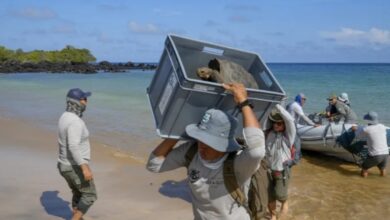Do not bring lethal weapons to the oceans
Listen this article
Plastic pollution is one of the greatest threats to our oceans and marine ecosystems. Let's not take more plastic to the beach!

Pollution on the beaches is evident: packaging, bottles, cigarettes, cans, and countless debris accumulate daily on the coasts of the seas and oceans. With the passage of time, it seems that garbage is part of shores and leaving waste is part of the experience of visiting beaches.
Leer en español: ‘No lleves armas letales a los océanos’
Pollution in the oceans and seas, especially plastic, is worrisome. However, despite knowing the consequences (death of animals, water pollution, among others), it seems that we are not aware of the enormous danger that plastics represent for the environment.
According to National Geographic, per minute, approximately one million plastic containers are sold worldwide and globally only one fifth of the total production of this material is recycled.
That is why the different elements that we leave on the beaches and that reach the oceans are 'lethal weapons'. Not only do they cause immense damage to the animals that inhabit these ecosystems, but in the long run we are harming ourselves.
To raise awareness of how damaging plastic can become, Corona, the Mexican beer brand, held an exhibition in Bolivar, Colombia, on January 1. The exhibition exhibited 8 plastic elements found inside marine animals.
Read also: Find out which are the most sustainable universities in Latam
- "Plastic bag found trapping a stork in Spain, in May 2018.
- Plastic bottle found in the stomach of a whale in Cabo de Palos, in November 2018.
- Plastic skin removed from the nose of a giant sea turtle in Costa Rica, in August 2015.
- Plastic spoon found in the stomach of a whale in Cabo de Palos, in November 2018.
- Plastic ring taken from the body of a turtle in the United States in June 2015.
- Plastic vessel found in the stomach of a whale in Cabo de Palos, in November 2018.
- Plastic cover found at the peak of a seabird in the Caribbean Sea, in November 2016.
- Cotton swab found in the tail of a seahorse, in Indonesia in January 2017. "
This company ensures that "currently more than 1 million birds and 100 thousand turtles die every year in the ocean due to plastic, and it is estimated that by 2020 the pace of production of plastics will have increased by 900%."
This is why the message is: let's not bring more lethal weapons to the ocean. If we are going to visit a beach, we must collect the waste that we produce and try to leave as clean as possible the place we use.
LatinAmerican Post | Marcela Peñaloza
Translated from "'No lleves armas letales a los océanos'"




